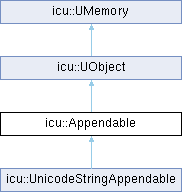Base class for objects to which Unicode characters and strings can be appended. More...
#include <appendable.h>

Public Member Functions | |
| ~Appendable () | |
| Destructor. More... | |
| virtual UBool | appendCodeUnit (char16_t c)=0 |
| Appends a 16-bit code unit. More... | |
| virtual UBool | appendCodePoint (UChar32 c) |
| Appends a code point. More... | |
| virtual UBool | appendString (const char16_t *s, int32_t length) |
| Appends a string. More... | |
| virtual UBool | reserveAppendCapacity (int32_t appendCapacity) |
| Tells the object that the caller is going to append roughly appendCapacity char16_ts. More... | |
| virtual char16_t * | getAppendBuffer (int32_t minCapacity, int32_t desiredCapacityHint, char16_t *scratch, int32_t scratchCapacity, int32_t *resultCapacity) |
| Returns a writable buffer for appending and writes the buffer's capacity to *resultCapacity. More... | |
 Public Member Functions inherited from icu::UObject Public Member Functions inherited from icu::UObject | |
| virtual | ~UObject () |
| Destructor. More... | |
| virtual UClassID | getDynamicClassID () const |
| ICU4C "poor man's RTTI", returns a UClassID for the actual ICU class. More... | |
Detailed Description
Base class for objects to which Unicode characters and strings can be appended.
Combines elements of Java Appendable and ICU4C ByteSink.
This class can be used in APIs where it does not matter whether the actual destination is a UnicodeString, a char16_t[] array, a UnicodeSet, or any other object that receives and processes characters and/or strings.
Implementation classes must implement at least appendCodeUnit(char16_t). The base class provides default implementations for the other methods.
The methods do not take UErrorCode parameters. If an error occurs (e.g., out-of-memory), in addition to returning false from failing operations, the implementation must prevent unexpected behavior (e.g., crashes) from further calls and should make the error condition available separately (e.g., store a UErrorCode, make/keep a UnicodeString bogus).
- Stable:
- ICU 4.8
Definition at line 54 of file appendable.h.
Constructor & Destructor Documentation
◆ ~Appendable()
| icu::Appendable::~Appendable | ( | ) |
Destructor.
- Stable:
- ICU 4.8
Member Function Documentation
◆ appendCodePoint()
Appends a code point.
The default implementation calls appendCodeUnit(char16_t) once or twice.
- Parameters
-
c code point 0..0x10ffff
- Returns
- true if the operation succeeded
- Stable:
- ICU 4.8
Reimplemented in icu::UnicodeStringAppendable.
◆ appendCodeUnit()
|
pure virtual |
Appends a 16-bit code unit.
- Parameters
-
c code unit
- Returns
- true if the operation succeeded
- Stable:
- ICU 4.8
Implemented in icu::UnicodeStringAppendable.
◆ appendString()
|
virtual |
Appends a string.
The default implementation calls appendCodeUnit(char16_t) for each code unit.
- Parameters
-
s string, must not be nullptr if length!=0 length string length, or -1 if NUL-terminated
- Returns
- true if the operation succeeded
- Stable:
- ICU 4.8
Reimplemented in icu::UnicodeStringAppendable.
◆ getAppendBuffer()
|
virtual |
Returns a writable buffer for appending and writes the buffer's capacity to *resultCapacity.
Guarantees *resultCapacity>=minCapacity. May return a pointer to the caller-owned scratch buffer which must have scratchCapacity>=minCapacity. The returned buffer is only valid until the next operation on this Appendable.
After writing at most *resultCapacity char16_ts, call appendString() with the pointer returned from this function and the number of char16_ts written. Many appendString() implementations will avoid copying char16_ts if this function returned an internal buffer.
Partial usage example:
In many implementations, that call to append will avoid copying char16_ts.
If the Appendable allocates or reallocates an internal buffer, it should use the desiredCapacityHint if appropriate. If a caller cannot provide a reasonable guess at the desired capacity, it should pass desiredCapacityHint=0.
If a non-scratch buffer is returned, the caller may only pass a prefix to it to appendString(). That is, it is not correct to pass an interior pointer to appendString().
The default implementation always returns the scratch buffer.
- Parameters
-
minCapacity required minimum capacity of the returned buffer; must be non-negative desiredCapacityHint desired capacity of the returned buffer; must be non-negative scratch default caller-owned buffer scratchCapacity capacity of the scratch buffer resultCapacity pointer to an integer which will be set to the capacity of the returned buffer
- Returns
- a buffer with *resultCapacity>=minCapacity
- Stable:
- ICU 4.8
Reimplemented in icu::UnicodeStringAppendable.
◆ reserveAppendCapacity()
|
virtual |
Tells the object that the caller is going to append roughly appendCapacity char16_ts.
A subclass might use this to pre-allocate a larger buffer if necessary. The default implementation does nothing. (It always returns true.)
- Parameters
-
appendCapacity estimated number of char16_ts that will be appended
- Returns
- true if the operation succeeded
- Stable:
- ICU 4.8
Reimplemented in icu::UnicodeStringAppendable.
The documentation for this class was generated from the following file:
- common/unicode/appendable.h